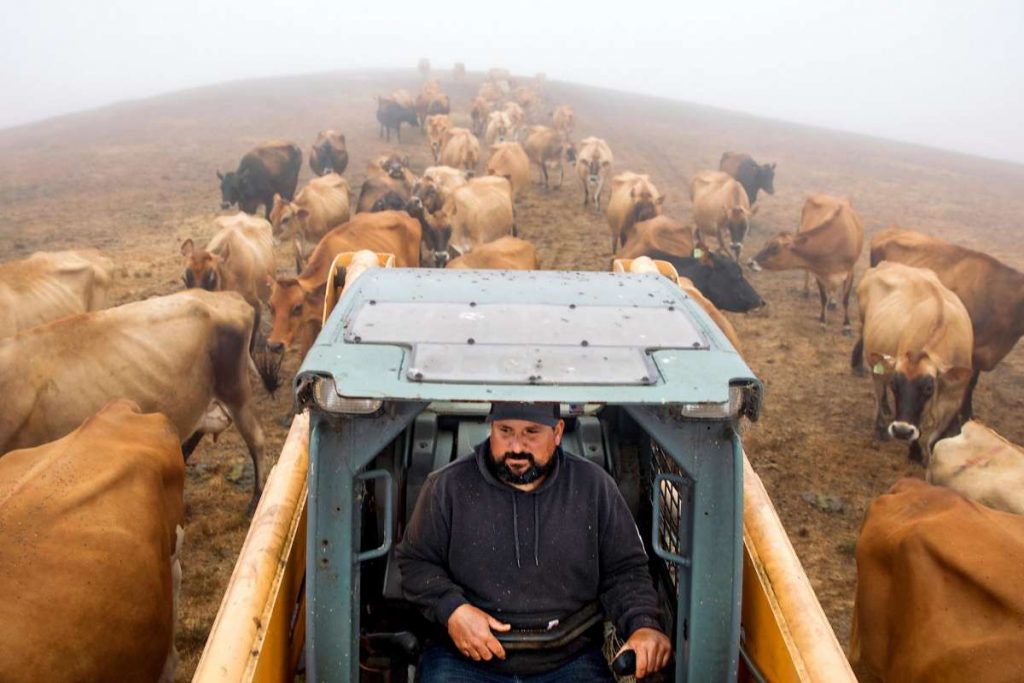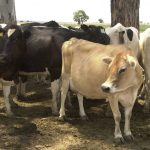
Louis Silva says he doesn’t need Saturdays and Sundays off. He loves taking care of the 125 dairy cows he and his wife, Marissa Silva, keep on her family’s ranch in the Marin County town of Tomales. It’s what he’s wanted to do since he was little, when his dad and uncle and grandfather had a dairy operation in Elk Grove (Sacramento County). It’s what Marissa has wanted too, even if it means that Louis, 34, now works 16-hour days while she cares for their two young children.
“We both love it, and we both understand that that’s the nature of the business,” says Marissa Silva, 31. “It’s good that we found each other, because not a lot of people understand that or would want to put up with it.”
Young dairy farmers like the Silvas are not the norm in the aging U.S. farm workforce, where the average age of farm operators is 57.5, according to the latest U.S. Census of Agriculture. The relentless demands of farm life are one of the main reasons most young adults don’t follow their parents into farming. Yet the Silvas’ dairy is among three in Marin run by farmers in their 20s and 30s who have recently signed on as suppliers to Straus Family Creamery in Petaluma, which uses their organic milk in its bottled milk, cream, yogurt, sour cream, butter and ice cream.
Dairy farming is a turbulent business, subject to fluctuating prices and oversupply. The number of dairy farms in the country dropped by 40% from 2002 to 2017, according the U.S. Department of Agriculture, meaning the country’s milk production became consolidated within larger farms. Yet over the same period, the number of farms in Sonoma and Marin dipped only slightly, from 159 to 156, USDA records show.
Albert Straus, founder and CEO of Straus Family Creamery, attributes Marin and Sonoma dairies’ staying power to the fact that approximately 85% of them sell organic milk, which fetches higher prices than conventional varieties.
Conventional dairies, on the other hand, have a tougher road in a fluctuating market, he says. “When the price goes down, you try to produce more milk to balance your income, even though it might be costing you more,” Straus says. “There’s no way to survive.”
Straus’ creamery sets prices and volume for its dairy farmers on a quarterly basis, when it holds meetings with suppliers to discuss sales and other numbers.
“They have such a good grasp on monitoring supply and demand,” Marissa Silva says. “He’s able to just give us a fair price, and we feel really confident we’re going to continue to get a fair price.”
Even though it has grown by double digits for many years, organic dairy accounted for only 5% of all U.S. milk product sales in 2016, with production concentrated in California, home of the most certified organic cows in the country, according to the Agricultural Marketing Resource Center. Organic dairy, and dairy in general, faces increased competition from plant-based milk substitutes, which grew in sales by 20% from 2017 to 2018, according to Nielsen data compiled for the Plant Based Foods Association.
Yet Straus also continues to grow, with a dozen total suppliers in Marin and Sonoma counties. It signed on the Silvas in April, and the other new young farmers providing milk to the creamery are siblings William Nunes and Lianne Nunes-Taverna at their family’s 100-year old ranch in Point Reyes National Seashore, and brothers Jayson and Jeremy Spaletta of JJ’s Family Dairy near Petaluma.
The Silvas are contracted to supply about 450 gallons of milk a day to Straus, which sends a truck down their gravel road every two days. They also sell a smaller amount to Daily Driver, the San Francisco creamery and bagel bakery. Together, it’s a relatively small amount compared with the 16,000 to 17,000 gallons Straus goes through daily.
The couple lease 220 acres from Marissa’s father, Gary Thornton, who raises beef cattle on the rest of the 1,013-acre property. It’s located in a gently sloping valley where their ancestors founded a dairy in 1852. The Silvas’ caramel-brown Jersey cows, which produce a milk high in fat, cluster on the expanse of grassland bleached white-blond in late summer.
Louis Silva wakes up every morning at 4 to get on his all-terrain vehicle and round up the cows into the milking barn, where a part-time employee milks them twice a day. After stopping for breakfast and maybe a quick nap, he makes the rounds feeding the various groups of cattle depending on their age and reproductive cycle.
Between feedings, he cleans the milk tank and assists the breeder, who comes every few days to artificially inseminate the cows. He takes a break midday to spend time with the family or drive into Petaluma for errands. He starts the cycle again around 3 p.m., rounding up the cows for milking and feeding, usually finishing up by 8 p.m.
Supplying for Straus means following sustainability measures like rotating pasture. Louis Silva spends less time feeding the cows from February through June, when there’s more grass for them to eat.
“When they’re on grass is my vacation time,” said Silva, whose last day off was the day the couple’s son, Reed, was born, about four months ago.
“I’ll be here unless I’m dead or in the hospital,” he says, but “I wouldn’t change it.”
Tara Duggan is The San Francisco Chronicle’s assistant food editor. Email: tduggan@sfchronicle.com Twitter: @taraduggan

























